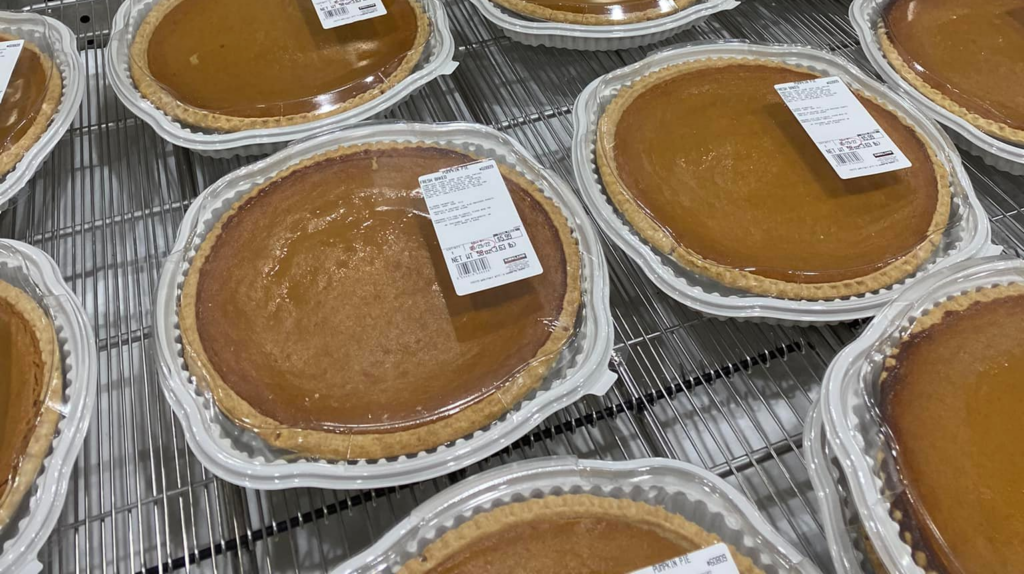Thanksgiving is a time for tradition, family, and, of course, food. For millions of Americans, the Thanksgiving meal isn’t complete without pie. Whether it’s the iconic pumpkin pie or other varieties like apple and pecan, the dessert table is often just as important as the main course. For many, purchasing a pre-made pie from retailers like Costco has become a convenient holiday tradition.
Costco, the giant warehouse retailer known for its bulk offerings and generous portions, has become one of the go-to places for Thanksgiving pies. But how many pies does Costco actually sell in the lead-up to Thanksgiving? The numbers are staggering, and they reflect both the scale of Costco’s operations and the increasing demand for convenience during the holiday season. Let’s dive into how Costco dominates the Thanksgiving pie game and what it means for other retailers in the space.

The Numbers: Millions of Pies Sold
In 2023, Costco’s Thanksgiving pie sales were nothing short of impressive. The retailer sold over 4 million pies in just three days—Monday, Tuesday, and Wednesday before Thanksgiving. Of these, nearly 2.9 million were pumpkin pies, while the remainder—around 1.3 million—were apple and pecan pies. Even more are expected to be sold here in 2024.
This massive volume of pie sales is indicative of Costco’s strong position in the holiday retail market. Their pies are famous for their large size, affordability, and consistent quality, making them an appealing option for families looking to save time in the kitchen.
Why Costco’s Pies Are So Popular
There are several reasons why Costco’s pies are so in demand around the Thanksgiving holiday. First, they are known for their size. Costco’s pumpkin pies are infamous for being enormous—often weighing in at around 5 pounds and measuring 12 inches in diameter. For families that are hosting large gatherings, Costco’s pies offer both great value and a quick solution.
Another factor that contributes to Costco’s pie success is the price. A 5-pound pumpkin pie typically costs around $6—a price that’s hard to beat, especially when compared to the smaller, often pricier options found at other retailers. For budget-conscious consumers looking to serve a crowd, Costco’s pies provide an unbeatable combination of quantity, quality, and price.
Additionally, Costco’s pies are known for their consistent taste. With recipes that have remained largely unchanged over the years, customers know what to expect when they buy one. This reliability in flavor—coupled with their accessibility and convenience—has made Costco’s pies an integral part of many Thanksgiving meals.
The Impact of Costco’s Success on Other Retailers
While Costco’s success in selling millions of pies each year is impressive, it also has significant implications for other retailers in the space. As experts in the retail sector at BigBoxBlog, we observe a few key trends and insights that are emerging as a result of Costco’s dominance in the Thanksgiving pie market.
The Price Advantage
One of Costco’s biggest advantages is its ability to offer pies at a very low price, thanks to its bulk-buying model. For other retailers, this creates a challenge—particularly for grocery stores and specialty bakeries that rely on higher profit margins. While some stores may offer smaller pies at a premium price point, Costco’s bulk model undercuts these competitors by offering more pie for less money. For example, a pumpkin pie at a typical grocery store can cost anywhere from $10 to $20, depending on the size and quality. Meanwhile, Costco’s $6 pie offers the same (or more) for a fraction of the cost.
This price differential forces competitors to reevaluate their pricing strategies. Many retailers may attempt to compete with Costco’s prices, but doing so often results in slimmer margins. For some, this means sacrificing quality to maintain competitive pricing, or offering discounts and promotions in hopes of attracting price-sensitive customers.
Convenience and Time-Saving
Another advantage Costco has over other retailers is its ability to offer a convenient, all-in-one shopping experience. Shoppers can pick up everything from the turkey to the pie in one trip, making it easier for busy holiday hosts to prepare for Thanksgiving. With many consumers prioritizing convenience, especially during the busy holiday season, Costco’s single-stop shopping experience positions it as a leading retailer in the food space.
For other retailers, this poses a challenge. Grocery stores and specialty bakeries that sell pies may not have the same breadth of offerings as Costco, forcing them to focus more on niche markets (e.g., organic or gluten-free options) or to promote their own time-saving alternatives. Larger department stores like Walmart may have a more diverse product selection but don’t offer the same combination of bulk pricing and convenience that Costco does.
Brand Loyalty and Consistency
Costco’s pies are beloved by many for their consistency in both size and taste. Brand loyalty plays a significant role in their continued success. Costco has effectively created a customer base that trusts its products, including its holiday pies, and this reliability ensures repeat business. For Costco, this translates into high sales numbers year after year.
In contrast, other retailers may struggle to build the same level of loyalty with their holiday products. For example, grocery stores and bakeries may offer a wider variety of pies, but they often lack the brand consistency that Costco delivers. A customer who buys a Costco pie one year is likely to return to Costco the next year for the same product. Retailers without this consistent brand recognition must focus on offering unique flavors or premium products to stand out in a crowded market.
Pressure on Small Businesses and Niche Markets
While Costco’s dominance can be viewed as a triumph of efficiency and value, it’s also worth considering the impact on small businesses and niche retailers. Small bakeries and local stores that offer homemade or gourmet pies may find it difficult to compete with Costco’s low prices and massive scale. These businesses often rely on more personalized service and higher-quality, hand-crafted pies, but Costco’s prices can make it challenging for smaller players to stay competitive, especially during the holidays when margins are tight.
For niche markets, Costco’s reach can be a double-edged sword. On the one hand, some customers may choose Costco because of its affordability, but on the other hand, there’s a growing demand for artisanal or specialized pies, such as gluten-free, vegan, or organic options. Smaller retailers can capitalize on these niche needs, but they must be strategic in promoting their offerings to consumers who are willing to pay a premium for unique, high-quality desserts.
Costco’s Impact on the Future of Thanksgiving Retail in 2025
Looking ahead, Costco’s pie sales offer valuable insights into the future of holiday retail. Shoppers are increasingly looking for value, convenience, and reliability, especially during the busy Thanksgiving season. For other retailers, this means a shift in how they approach holiday offerings. Competitors will need to focus on providing unique products, building brand loyalty, and finding ways to offer convenience—whether through delivery services, curated meal kits, or expanded product selections.
For small businesses and niche markets, it will be crucial to identify and cater to specialized customer needs while offering products that can’t be easily replicated by big-box retailers. Whether it’s focusing on quality ingredients or providing a more personalized shopping experience, the key to competing with Costco will be differentiation.
Conclusion
Costco’s Thanksgiving pie sales numbers are a testament to the retailer’s dominance in the holiday food market. With millions of pies sold each year, Costco has carved out a significant slice of the Thanksgiving pie market (pun intended). While other retailers may struggle to compete with Costco’s low prices and bulk offerings, there’s still room for niche businesses to thrive by focusing on quality, unique products, and personalized service. As Thanksgiving approaches and pie sales continue to soar, Costco will undoubtedly remain the go-to destination for many holiday shoppers—but the competition is far from over.
